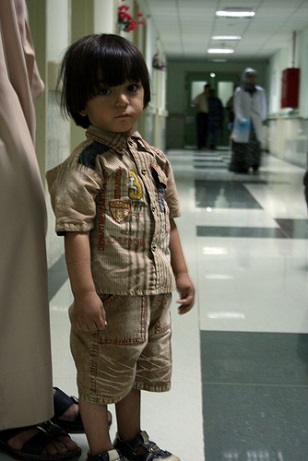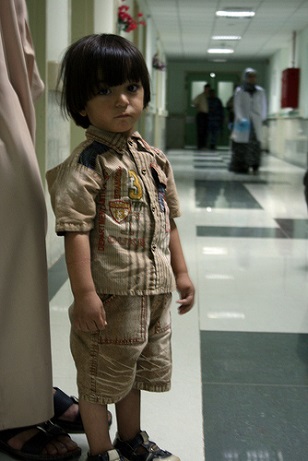 Larisa Epatko for PBS NewsHour / Flickr)” width=”308″ height=”461″ />Boy at hospital in Fallujah, Iraq. (Photo: Larisa Epatko for PBS NewsHour / Flickr)Fallujah doctors, residents and NGO workers accuse the Iraqi government of war crimes and crimes against humanity in its ongoing attack against the city – conducted ostensibly against al-Qaeda affiliate the Islamic State of Iraq and Syria.
Larisa Epatko for PBS NewsHour / Flickr)” width=”308″ height=”461″ />Boy at hospital in Fallujah, Iraq. (Photo: Larisa Epatko for PBS NewsHour / Flickr)Fallujah doctors, residents and NGO workers accuse the Iraqi government of war crimes and crimes against humanity in its ongoing attack against the city – conducted ostensibly against al-Qaeda affiliate the Islamic State of Iraq and Syria.
Doctors, residents and NGO workers in Fallujah are accusing the Iraqi government of “war crimes” and “crimes against humanity” that have occurred as a result of its ongoing attack on the city.
Dr. Ahmed Shami, the chief of resident doctors at Fallujah General Hospital, told Truthout that since Iraqi government forces began shelling Fallujah in early January 2014, at least 109 civilians have been killed and 632 wounded.
“Ten of those killed were children, and 40 of the wounded are children,” Shami said. He also said five of the dead are women, as are 35 of the wounded.
“Many children have been killed in cold blood as the result of the indiscriminate shelling of the city,” Shami said. “At the same time, there are many young people from the city who (Iraqi Prime Minister Nouri al-)Maliki’s army has killed and burned their bodies.”
While the Iraqi government has not cut the city’s water and electricity, doctors in Fallujah told Truthout that the Iraqi army, which they refer to as “Maliki’s forces,” continues to prevent medical supplies from entering the city.
Truthout spoke with another doctor from Fallujah, who spoke on condition of anonymity out of fear of reprisals from the Maliki government. “Many houses and even the mosque near our house have been attacked, and many civilians killed and injured,” the doctor said. “Many people have been killed before they could reach the hospital, which has also been targeted by Maliki’s army.”
The doctor and the doctor’s family have been evacuated from the city, since their neighborhood was under constant, direct attack. “I am now a refugee with my brother’s and sister’s families in another city in Iraq, living an extremely hard life,” the doctor said.
In the area where the doctor is, there are 1,300 families from Fallujah, and there are up to five families seeking refuge in a single home. “Many are living in school classrooms, with three families in each classroom,” the doctor said.
“What is happening in Fallujah is a war crime,” the doctor said. “Believe me that there have never been any official nor military targets attacked by Maliki’s army. Civilians are the only target.”
On February 14, Nickolay Mladenov, the special representative of the United Nations secretary-general in Iraq expressed his concerns about the deteriorating security situation and growing humanitarian catastrophe the people in Fallujah were facing.
“I am particularly concerned about the rapidly deteriorating conditions in Fallujah, where many residents are caught up in the fighting,” Mladenov said. “The UN continues to urge for humanitarian access to the city.”
According to Mladenov, “More than 60,000 families have been displaced since the fighting broke out in the Anbar province,” and “the displaced families are running out of food and drinking water and suffer from poor sanitation and limited access to health care.”
Other relief organizations pin the number of displaced at 300,000.
While the Iraqi government called a 72-hour truce that continued to hold at the time of this writing, people inside the city continue to suffer. They fear more fighting is to come.
Killing Civilians, Shelling Hospitals
Dr. Muhamad Al-Darraji, a Fallujah resident who founded the Conservation Center of Environmental and Reserves in Fallujah, a human rights and environmental NGO, told Truthout he believes the Iraqi government is carrying out “crimes against humanity” in Fallujah.
His group provided Truthout with much video evidence of dead and wounded civilians in the city, as well as photographs of artillery shells that had struck nearby Fallujah General Hospital.
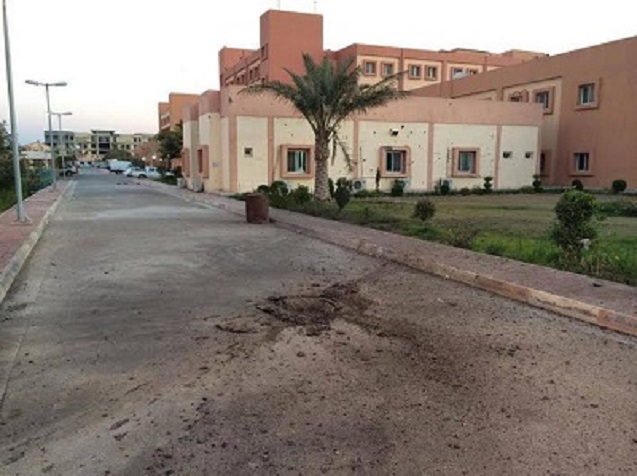 The Iraqi army has been shelling Fallujah for more than a month, with mosques, hospitals (pictured here), and civilian homes often being hit. (Photo: Fallujah General Hospital)
The Iraqi army has been shelling Fallujah for more than a month, with mosques, hospitals (pictured here), and civilian homes often being hit. (Photo: Fallujah General Hospital)
Despite the videos posted on Youtube being mostly in Arabic, footage clearly shows civilians who have been wounded or killed.
A 19-year-old pregnant woman had her leg blown off by what the family claimed was “indiscriminate shelling” by the Iraqi army, while she was in her home in northern Fallujah. Another video shows a young boy with shrapnel in his back being treated at a hospital.
More video shows the severely wounded being operated on, while other clips show damage inside Fallujah’s main hospital. Footage of wounded children, women and young girls is widely available online, some of it extremely graphic.
Darraji’s NGO filed a formal report detailing its concerns to the International Criminal Court on February 17, 2014.
“Official” Reasons
The Iraqi ministry of interior claims that al-Qaeda’s affiliate, the Islamic State of Iraq and Syria (ISIS), has taken over parts of the city. This claim has been reported widely by most mainstream media outlets.
Shami told Truthout that while Maliki is claiming that the military operation in Fallujah is to remove militants from the city, “The people he is attacking are the people of the city itself,” and that “tribal rebels have taken over the city. The people of Fallujah are peaceful and only want their basic human rights, but at the same time they are defending themselves from Maliki’s sectarian army attacks.”
Feurat Alani, a French-Iraqi journalist with family ties in Fallujah, has reported that ISIS, while maintaining a small presence in the city, is not playing a significant role in the fighting in Fallujah.
Much has been said and written about ISIS raising its flag atop a building in Fallujah, an act that was taken to be a sign of their power in the city. Of this, Alani reported, “They took the flag down five minutes later, when ordered to by tribal leaders. This shows that the tribes control Fallujah.”
Attacking Protesters
In early January, Iraqi government forces dispersed a protest camp in Fallujah, while simultaneously arresting a politician who was sympathetic to goals of the protesters, events that sparked the most recent violence in Fallujah and Ramadi.
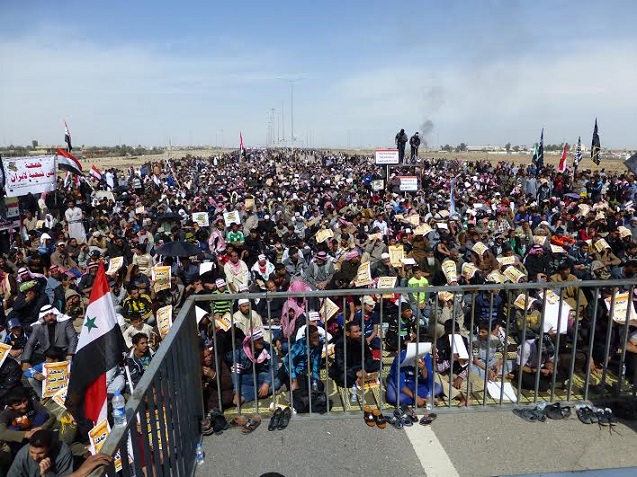 Demonstrations have been ongoing for more than a year in protest of demands for human rights that went unheeded by the Maliki government. (Photo: Dahr Jamail)
Demonstrations have been ongoing for more than a year in protest of demands for human rights that went unheeded by the Maliki government. (Photo: Dahr Jamail)
However, the situation actually began far earlier. Beginning in late 2012, thousands of demonstrators gathered every Friday on the main highway linking Baghdad and Amman, Jordan, which runs by the outskirts of Fallujah.
Sunnis in Fallujah and the rest of Iraq’s vast Anbar Province were enraged at the Maliki government because his security forces, still heavily staffed by members of various Shia militias, were killing or detaining their compatriots from the region, as well as across much of Baghdad.
Angry protesters took to the streets every Friday to pray and express their anger by holding signs that read, “We demand an end to checkpoints surrounding Fallujah. We demand they allow in the press. We demand they end their unlawful home raids and detentions. We demand an end to federalism and gangsters and secret prisons!”
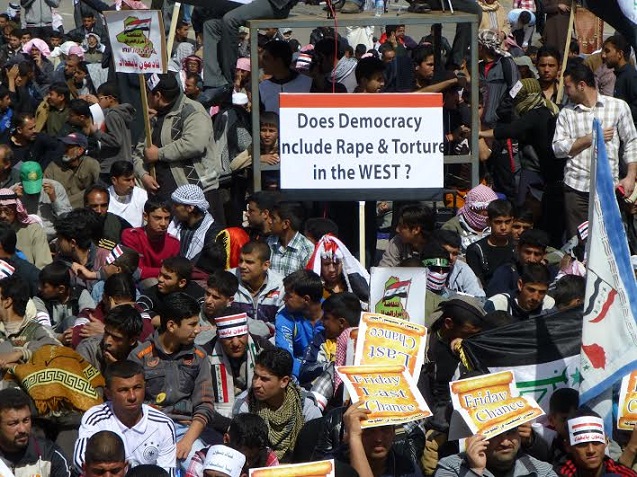 Fallujah residents have been complaining for more than a year about Maliki government forces conducting illegal detentions, as well as torturing and raping detainees. (Photo: Dahr Jamail)
Fallujah residents have been complaining for more than a year about Maliki government forces conducting illegal detentions, as well as torturing and raping detainees. (Photo: Dahr Jamail)
In March 2013, one of the leaders of the demonstrations, Sheikh Khaled Hamoud Al-Jumaili, told Truthout, “Losing our history and dividing Iraqis is wrong, but that, and kidnapping and conspiracies and displacing people, is what Maliki is doing.”
Jumaili admitted at the time that the Maliki government was not meeting any of their demands and feared violence if the government continued to ignore the widespread grievances of the residents of Iraq’s Anbar province.
The same day Truthout spoke with Jumaili, a demonstrator was gunned down by Iraqi forces in Ramadi. At the time, Lt. Gen. Mardhi al-Mahlawi, commander of the Iraqi Army’s Anbar Operations Command, said the authorities would not hesitate to deploy troops around the protest site again “if the protesters do not cooperate.”
The following day, the Maliki government warned that the area was becoming “a haven for terrorists,” echoing the term the Americans used prolifically during their occupation of Fallujah.
Historical Context
When the United States invaded Iraq in 2003, there was no fighting in Fallujah. Tribal leaders in the city allowed the US military to enter the city in peace.
However, the US military fired on unarmed demonstrators outside of a school that was being occupied, thus beginning resistance within the city to the US occupation.
In the wake of four US mercenaries being killed in the city in April 2004, the US military laid siege to Fallujah under the pretense of “fighting terrorism,” just as the Maliki government is doing today.
Finding stiffer resistance than expected, the first siege ended after one month. Between May and November 2004, the US military bombed and shelled the city, often targeting wedding parties, funerals, civilian homes and mosques. During this time, collective punishment often was employed, cutting water, electricity and medical supplies to the city.
On November 8, 2004, the US military launched a massive siege of the city, again under the guise of “fighting terrorism,” claiming that Jordanian terrorist Abu Musab al-Zarqawi was in the city, despite there never having been proof he had stepped foot in the city.
According to CCERF, approximately 5,000 residents of Fallujah were killed during the second siege.
Iraqi Parliamentary Speaker Osama Al-Nujaifi recently called for a ceasefire in Fallujah. Nujaifi, who heads the Sunni Arab Mutahidoun bloc, called for a suspension of military operations across Anbar.
“The government must totally suspend its military operations in Anbar,” Nujaifi said, adding that “displaced Anbar residents … must go back to their homes.”
Anbar Provincial Council official Adhal Al-Fahdaw told Asharq Al-Awsat, “There are many tribal and religious leaders who are trying to defuse the crisis to reach a solution. In light of this, we are calling for an open-ended deadline, because the solution to the Fallujah crisis will come from the tribal community, not from the military.”
Meanwhile, the US government continues to ship weapons to the Maliki government to fight “Sunni Islamist militants” in Anbar province. To date, according to the Congressional Research Service, the US government has spent more than $20 billion to equip and train the Iraqi military.
Thank you for reading Truthout. Before you leave, we must appeal for your support.
Truthout is unlike most news publications; we’re nonprofit, independent, and free of corporate funding. Because of this, we can publish the boldly honest journalism you see from us – stories about and by grassroots activists, reports from the frontlines of social movements, and unapologetic critiques of the systemic forces that shape all of our lives.
Monied interests prevent other publications from confronting the worst injustices in our world. But Truthout remains a haven for transformative journalism in pursuit of justice.
We simply cannot do this without support from our readers. At this time, we’re appealing to add 50 monthly donors in the next 2 days. If you can, please make a tax-deductible one-time or monthly gift today.
